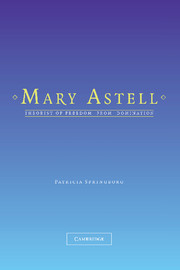Book contents
- Frontmatter
- Contents
- Acknowledgements
- Mary Astell, a Brief Chronology
- Introduction: Astell and Early Modern Feminism
- 1 Mary Astell, Philosopher, Theologian and Polemicist
- 2 Astell, Drake, Education, Epistemology and the Serious Proposal
- 3 Astell on Marriage, Patriarchalism and Contractarianism
- 4 Mary Astell and the Settlement of 1689
- 5 A Fair Way with the Dissenters and Their Patrons
- 6 Astell, Locke and the Highway Man: A Test Case
- 7 Astell, Drake and the Historical Legacy of Freedom
- Appendix: Glossary and Select Biographical Notes
- Notes
- Select Bibliography
- Index
2 - Astell, Drake, Education, Epistemology and the Serious Proposal
Published online by Cambridge University Press: 07 September 2009
- Frontmatter
- Contents
- Acknowledgements
- Mary Astell, a Brief Chronology
- Introduction: Astell and Early Modern Feminism
- 1 Mary Astell, Philosopher, Theologian and Polemicist
- 2 Astell, Drake, Education, Epistemology and the Serious Proposal
- 3 Astell on Marriage, Patriarchalism and Contractarianism
- 4 Mary Astell and the Settlement of 1689
- 5 A Fair Way with the Dissenters and Their Patrons
- 6 Astell, Locke and the Highway Man: A Test Case
- 7 Astell, Drake and the Historical Legacy of Freedom
- Appendix: Glossary and Select Biographical Notes
- Notes
- Select Bibliography
- Index
Summary
A Serious Proposal, Text and Context
Astell's educational work, a Serious Proposal to the Ladies for the Advancement of their True and Greatest Interest, brought her to greater public notice. Published in 1694, it is one of the most important and neglected in a long series of works advocating the establishment of educational academies for women. Republished in 1695, its reception was sufficiently controversial to cause Astell to respond with a lengthy sequel, A Serious Proposal, Part II (1697). Her project, set out in the first part of the Proposal, was to establish a religious community for ‘Ladies of Quality’ funded by the dowries they brought with them and monies earned by founding a school. Of all of Astell's works, this one has the most complicated textual history. For when in 1694 Astell had completed the first part of A Serious Proposal, the work, ironically, was taken for that of Damaris Masham, Locke's companion, as typical of what might be expected of the daughter of the Cambridge Platonist Ralph Cudworth. In fact, Astell's Proposal, together with the Astell–Norris correspondence, attracted a fierce response from Lady Masham in Discourse Concerning the Love of God (1695), to which Astell in turn responded without mentioning Masham by name – if she was even aware of her authorship – in A Serious Proposal, Part II.
- Type
- Chapter
- Information
- Mary AstellTheorist of Freedom from Domination, pp. 81 - 112Publisher: Cambridge University PressPrint publication year: 2005



